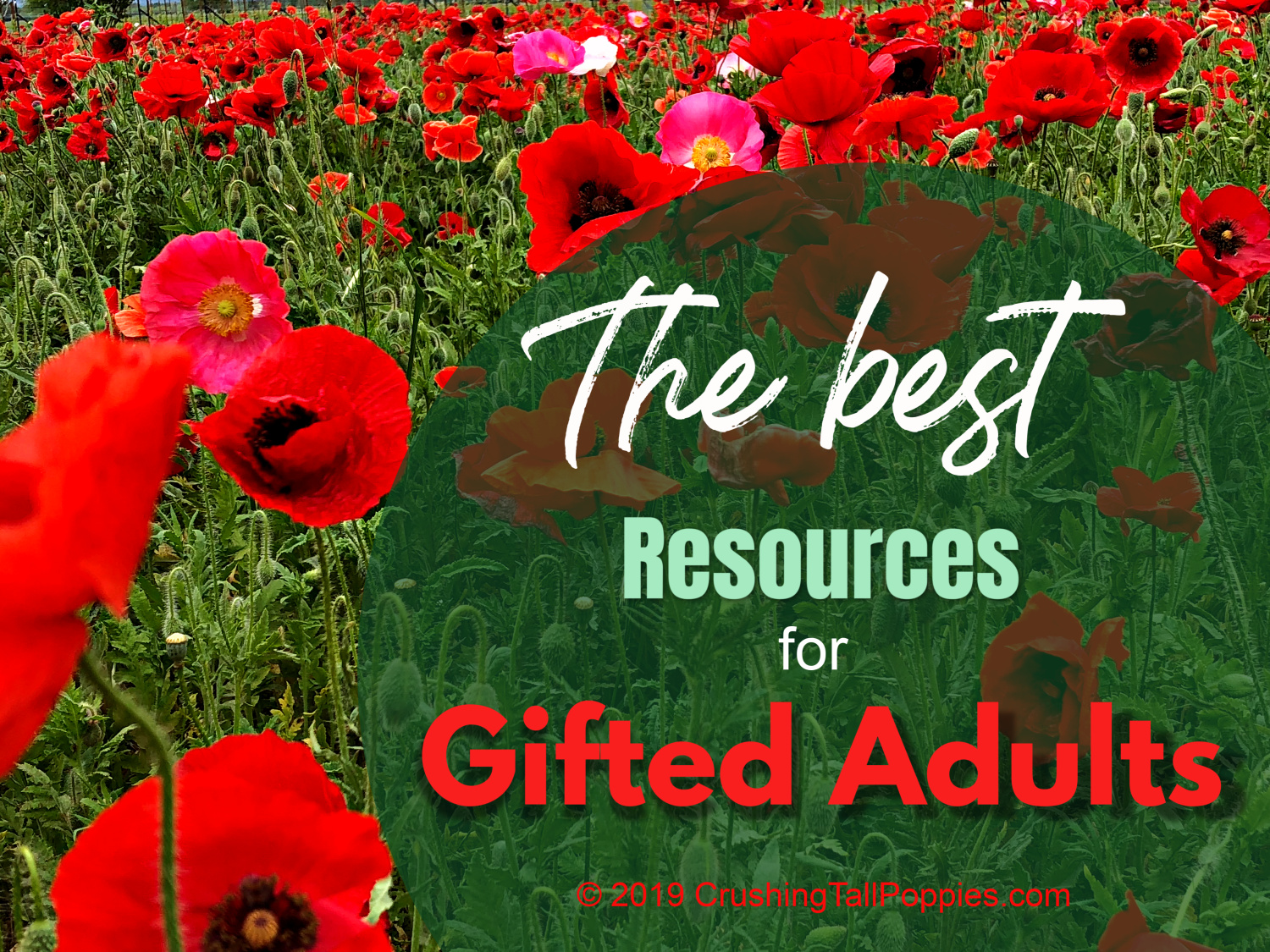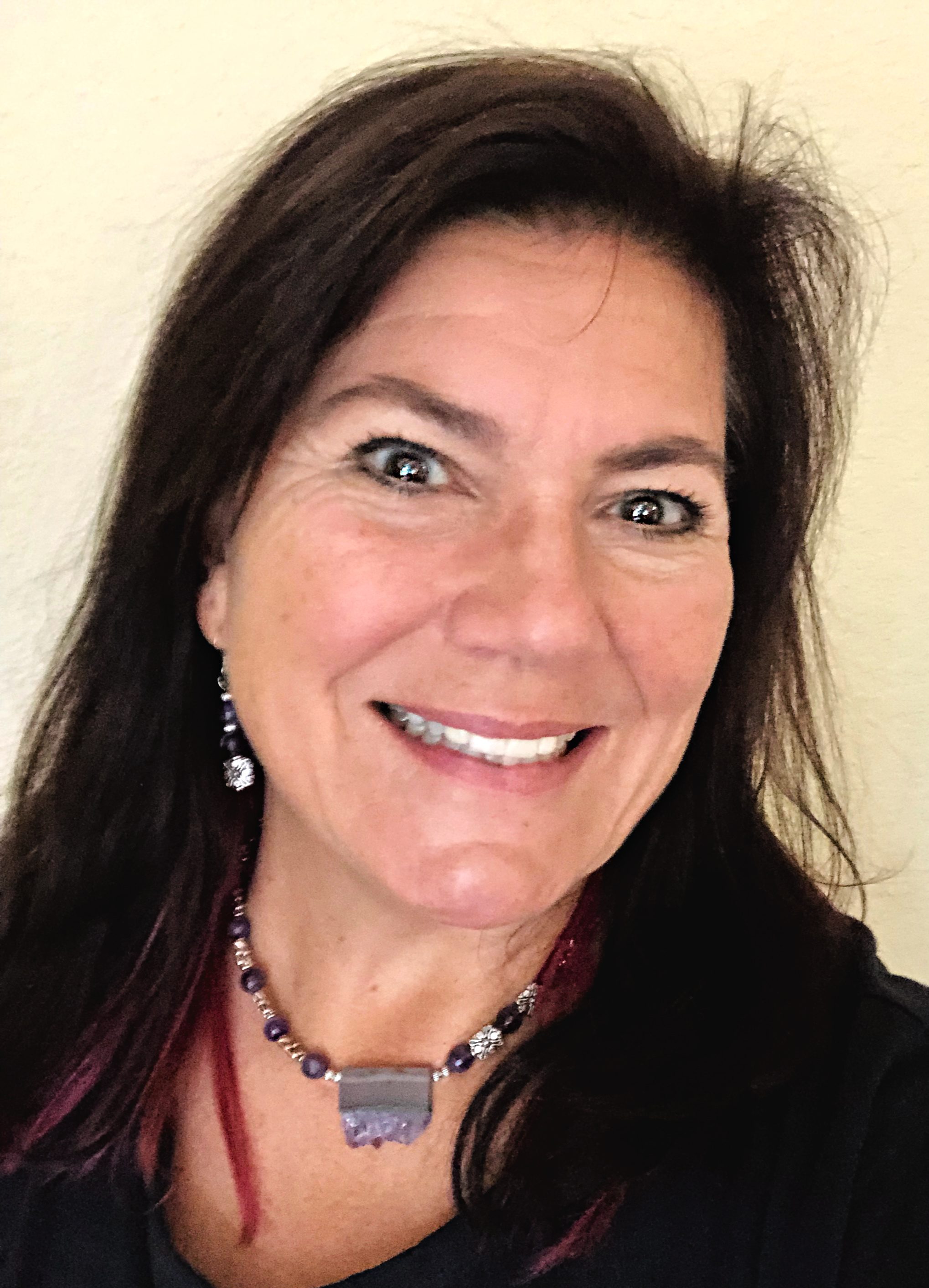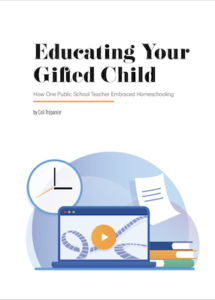The Best Resources for Gifted Adults

Gifted children inevitably grow up. One of the undeniable and inescapable outcomes of this process is—they grow up to become gifted adults.
Giftedness is not only a childhood condition or simply a function of education. Giftedness is a lifelong, day-in, day-out , 24-hours-a-day joy and struggle, even for gifted adults.
A joy and a struggle
And this may be true especially for gifted adults as there is a significant lack of research studies and data on adult giftedness, scant information on the behavioral aspects of giftedness in adults, and even less available support or therapeutic help for gifted adults. It’s almost as if we gifted adults don’t exist, but we do. And we are here, shining in all our beautiful, quirky, creative, curious, intuitive, emotional, painful and intense glory.
I personally discovered this unfortunate lack of information when I was searching for help, support, information—-anything—-about gifted adults for myself and my own gifted journey. Through a multitude of web queries and also asking questions of anyone who would listen, I most often ended up frustrated, disappointed and even a bit fearful–okay, a lot fearful. Gifted adults seemed to be an unfamiliar, almost forgotten population. It felt as though we’ve been left out in the cold, but we exist, and we need help, information, and support, dang it!
Through the hours and days I spent scouring the web to gather any information I could find about giftedness in adults, I collected as many resources on gifted adults as I could. This psychological, social and emotional realm—giftedness in adults—with its significant lack of resources, and support, is an area in critical need of more focus–more research, more information, more support, and please, more mental health professionals who get us!
My personal experience with this lack of
Despite this scarcity, below are some of the best resources I found for gifted adults. I’m sure there are more, and it would benefit all of us gifted adults if you would share any information, websites, books, therapists, and any other resource for gifted adults you have. Please leave this information in the comments below with links to help us find them!
We gifted adults have got to stick together and help each other out! Are you with me?

WEBSITES
SENG–Supporting Emotional Needs of the Gifted: Adult Giftedness
SENG’s resource library with many articles about adult giftedness.
From the website (also see more information about Kate Arms in her comment to this article below):
“It is the primary vehicle for me to do my life’s work: helping people thrive as the fullest version of themselves and creating effective systems that support the people working within them. I have spent the past three decades studying how human beings thrive and how organizations and institutions can be structured to support individuals while also achieving big goals.
My studies have included biology, psychology, cognitive science, philosophy, theories and practices of constitutional democracy, coaching, systems theory, leadership, and anthropology. I have worked as a lawyer, an administrator, an artist, a writer, and a coach.”
Click here to learn more about Kate Arms and Signal Fire Coaching
From the website:
“Supporting you in your personal & social development as a gifted person. Finding out you are gifted is something that happens at one point in time; understanding exactly what that means for you, meeting other people like you, and finding belonging, adequate support, and encouraging social mirroring as a gifted person is a journey of a lifetime. InterGifted started as a social experiment in 2015, inviting gifted adults to gather all around the world in community and via gifted-specific coaching, mentoring, and workshops. Those of us who created InterGifted and who still work hard to support it every day are all gifted, and we know the struggle, the joys, the challenges and opportunities of being a gifted / twice-exceptional neurominority in a neuromajority world. We also know how hard it can be to find gifted-specific literature, resources
Click here to learn more about Intergifted.

Your Rainforest Mind–Support For The Excessively Curious, Creative, Smart & Sensitive
From the website:
“Because the label ‘gifted’ is often controversial and confusing, I developed the analogy of the rainforest mind. Many very smart folks don’t identify themselves as gifted. If the analogy speaks to you, I hope that my blog posts will help you better understand the complexities of your creative, sensitive, passionate, and smart self. And that my ideas will help you live like the thriving rain forest– in balance, peace, grace and beauty, and in support of all beings on the planet. “
Click here to learn more about Your Rainforest Mind.
Eric Windhorst — Eric is a counsellor & coach, educator, (re)searcher, and writer, passionate about personal growth and our planetary home.
From the website:
“My website’s theme—growing with nature in mind—captures my approach to counselling, coaching, and psychotherapy. I believe that each person has a true, inner nature (sometimes called the true self, or soul, or spirit) and that this nature yearns for expression (and growth) throughout an individual’s life. I also believe that each person’s inner nature has something important to offer the wider world. Each individual’s life purpose is tied to the intentions of her or his unique, inner nature.”
Click here to learn more about Eric Windhorst and his services.

Hoagies’ Gifted Education Page—Gifted Adults — Website page with gifted adult resources
Click here to for Hoagies’ resource page for gifted adults.
Gifted Ireland — Gifted Adults — Website page with gifted adult resources
Click here for Gifted Ireland’s resource page for gifted adults.
High Ability and Talent Development Resources—is a website with a network of related sites including The Creative Mind; Creative Women; Depression and Creativity; High Ability; Highly Sensitive and Creative; The Inner Actor; The Inner Writer; The Inner Entrepreneur, Anxiety Relief Solutions and Personal Growth Information. All created and edited by Douglas Eby.
Click here for the High Ability and Talent Development websites.

FACEBOOK GROUPS
Gifted Adults — Closed Group
A popular, dynamic and active group for gifted adults
Click here for the Gifted Adults Facebook group.
Intergifted — Secret Group with a one-time moderate fee to join.
From the website:
“Finding and connecting meaningfully with gifted and twice- or multi-exceptional peers is not always easy, yet we all need appropriate mirroring and to find our tribe. InterGifted’s Supportive Peer Community was created to for that very purpose. For the last four years, we have cultivated and curated a wonderfully supportive and dynamic community of nearly 700 gifted adults (and growing) around the world. We meet on Facebook in a moderated secret group and there, you can discuss giftedness and personal and professional development in the safety of peers who get you. You can learn to enjoy your unique mind as you develop among others who share the same high intensity, complexity and drive to grow as you.”
Click here to learn more about joining Intergifted’s secret Facebook group.

ARTICLES
“Discovering the Gifted Ex-Child” by Stephanie S.Tolan
“Surprised to be gifted: the inner world of unrecognized giftedness” by Cat Robson
“Unrecognized Giftedness: The Frustrating Case of the Gifted Adult” by Mary Lou Streznewski
“Can You Hear the Flowers Singing? Issues for Gifted Adults” by Deirdre V. Lovecky
“Fostering adult giftedness” by Sharon Lind
“Gifted adults: Embracing complexity” by Dr. Gail Post
“What Can We Learn From Gifted Adults?” by Ian Byrd
BOOKS
The Gifted Adult: A Revolutionary Guide for Liberating Everyday Genius by Mary-Elaine Jacobsen
Bright Adults: Uniqueness and Belonging across the Lifespan by Ellen D. Fiedler
Why Smart People Hurt: A Guide for the Bright, the Sensitive, and the Creative by Eric Maisel

THERAPISTS, PSYCHOLOGISTS, PSYCHIATRISTS
Tracy N. Tanner—Counseling and Coaching for the Gifted, Austin, TX
Paula Prober—A licensed counselor and consultant in private practice in Eugene, Oregon, Paula specializes in counseling gifted adults and youth (in the state of Oregon, USA) and consults with parents of gifted children and with gifted adults internationally.
Dr. Jerald Grobman, M.D.—Psychotherapy services for the gifted. New York, NY
Dr. Gail Post, Ph.D.—“My experience as a Clinical Psychologist for over 30 years has given me a comprehensive understanding of general psychotherapeutic techniques, as well as expertise in several areas of specialization. This has included work in inpatient, outpatient, college counseling and medical settings along with research and supervision. My early training was influenced by both psychodynamic and cognitive-behavioral approaches, as well as a two-year post-graduate program at the Gestalt Institute of Cleveland.”, Jenkintown, PA

These are certainly not the only resources for and about gifted adults; these are the ones I found to be the most up-to-date, comprehensive, and useful. If you have some resources, articles, books, and therapists focusing on gifted adults which you have found to be helpful, please leave the information and links to these resources in a comment below.
 Crushing Tall Poppies
Crushing Tall Poppies



Thank you! I found your site with a simple Google search. So happy. I find it hard to open up to anyone about “so-called hardships,” though we all know they are real. To loved ones other than immediate family, it is hard to come out and say, “Well, you know, it can be so difficult when you know the solution and everyone else will struggle with you for days and then come up with it and agree finally, and be mad at you still somehow.” (for example).
I want to be more blunt, and I am in practice of being polite. 🙂
being who I am can be a stress; I appreciate your effort in these resources.
I read “your rainforest mind” about 4-5 years ago and loved it! I thought I was going crazy thinking I had regressed in IQ because I was a “gifted child” with many career difficulties. 😉
it is making sense now, and with support, it helps to gain strategies to overcome the 99%-ers’ way of thinking. we all have to get along, there are just fewer of us. My analogy is this is why business hours are 9-5, it is built on the majority of how people’s sleep chronology is set. the others have to zombie along their day, or start coding, or painting so they can do it any hour of the day.
Reach out anytime. molly@mollygleizes.com
https://www.linkedin.com/in/mollygleizes/
Thank you, Molly, for reaching out! And yes, being gifted can be a burden–if only everyone could understand that!
Hi,
I’m a gifted mid-forties adult who only just realized this early a.m. that this aspect of my life, or rather many aspects of my life, might be causing me a lot of problems. Are there any non-profits that receive grants to help gifted adults cope better with major life events and combating depression and feelings of inadequacy? Are there any supportive programs that help gifted adults navigate life events better?
I also have a skull-based brain tumor and other severe chronic health problems. I thought these conditions were the primary source of my inability to focus, find meaning in my life, et cetera, but I realized right before I found your site that I’m struggling also because of how my mind sees this world and people in it. I know, for example, that heightened apathy and depression seem to be tumor symptoms, but I also recognize that my health and trying to cope with it while dealing with a world that at times doesn’t make sense to me as a result of my perspective as a gifted adult are also part of the problem.
Until tonight, I hadn’t even really thought much about how being gifted might make it more difficult, in the face of overwhelming health and social struggles, to value my life and interact well with others who aren’t gifted and who seem slower and make confusing (to me) decisions. I’ve grown so used to playing the part of not being gifted so that I could fit in with family, community members, friends and others that I completely forgot that I am. Again, I’m just now realizing that maybe some of what I’m dealing with is likely the result of never being appropriately prepared for many aspects of life. I was prepared for so many things, but not for dealing with what seem like illogical decisions by so many people and the severe alteration of my life by illnesses. I don’t fear death, btw. I fear severe debilitation that takes more of my independence and mental abilities and the people who cause delays, errors, stress, etc that further wastes my time and adds to the strain I’m under.
Please note: I have aphasia from the tumor and I spent the better part of my life dumbing down my vocabularly to adapt to a world with so many people who aren’t gifted and who struggle to understand. So, if any part of this doesn’t make sense, please let me know.
Hi B.,
I am so glad you took the time to write, and I apologize for replying two weeks later. I’ve been in the middle of a near-cross country move. Packing and unpacking . . .
As for as organizations focused on gifted adults, I will point you to Paula Prober and her website, Your Rainforest Mind. Paula is well known as the expert in all things regarding gifted adults. Also, GHF Learners has a website, their Forum, which has many groups based on mutual interests where gifted members can privately interact and support each other. By the way, GHF Learners is not just for gifted children and their education; it is for all gifted people and our lifelong quest for knowledge. Here’s the link: GHF Learners Forum
I can relate to a gifted adult’s realization that our giftedness can be the root of many things in our lives that we once attributed to other health and psychological conditions. It’s the intensity with which we experience our world, like seeing our world through a magnifying glass, making everything appear bigger, maybe more intimidating or less tolerable, and with much more clarity. If, as gifted adults, we did not know and understand this about ourselves, those intense feelings can be unsettling; they certainly were for me.
No need for apologies about our habit of dumbing down; all of us gifted adults can relate to that. It’s a survival skill, sometimes.
I hope that your further understanding about your giftedness and the role it plays in your physical and mental health can bring you more peace in your life. If ever there is more that I can do for you, please let me know—-I sincerely mean that.
Take care, B.! ~Celi
I am a gifted young adult looking for resources and support.
It feels wrong to attempt to summarize what is really quite a complicated history in only a few sentences. Therefore, I will avoid doing so; rather, I will proceed to the specifics of what it is that I am looking for. And that I hope you may be able to help me find.
I am hoping to find environments that can support the speed and depth at which I learn. Unfortunately, I was unaware of the magnitude and implications of my giftedness until about two years ago. I am now 19 years old. Most, if not all, of the programs out there are geared towards children or adolescents. I will note that I disagree with much of the societal definition of giftedness, especially with respect to age. However, I do not feel that I can get to where I need to be on my own.
I would really appreciate it if you could let me know of any programs, resources, etc. for gifted adults my age. I am hoping to find mentor-like relationships or college programs geared towards gifted individuals.
Thank you for your time
Hi Gal!
There are a few websites that offer support and online social interaction. One that is popular and has different gifted groups based on interests is GHF Learners. The website is https://ghflearners.org GHF also has a forum and that is where you can find groups of gifted people based on interests. The website is: https://forum.ghflearners.org/
Have you tried Mensa? You can also try joining and volunteering for your state’s or area’s gifted education group. Lastly, there are many gifted adult groups on Facebook. Do a search and see if any interest you.
If you have any other questions, please don’t hesitate to ask!
Hey Gal! Hope you’re still around! I am a young gifted too. About 22 years old this year. And I think that we (young gifted adults) are even more at risk when it comes to find useful ressources. I cannot count how many times I tried to find responses on some questions I had on life in general. But find nothing. It’s like between childhood and adulthood we are to struggle alone. If you read this one day, contact me at kameleyon4giftedness@gmail.com. Maybe, we’ll create the first gifted community exclusively for young adults.
Hi Celi,
Is there anyone you can recommend for (Gifted People) therapy in NJ?
I can recommend the SENG list of mental health providers here: https://www.sengifted.org/providers
And Hoagies’ page of mental health professionals: https://www.hoagiesgifted.org/professionals.htm
It can be difficult to find mental health professionals who understand giftedness. And sometimes you can find the right therapist who is willing to learn about and understand giftedness when given the information.
Best of luck on your search!
Hi-
My therapist relucted to help me with my issue of having twice exceptional profile because she doesn’t believe I have it and not qualified to handle my case. I
am going through a frustrating time trying to figure thing out, I feel I have twice exceptional
condition and it not helping me to advocate for myself.
Monique
Hi Monique,
Is finding another therapist who understands 2e people a possibility?
Hi
Finally spoke to my therapist again and her some articles to read about 2e and she
finally agree I am 2e.
Monique
Great job advocating for yourself, Monique!
Hi my name is Monique T. There’s many reason I call myself twice exceptional , because
I have many evidence that I am. I taught many academic skills and they are math, science,
some technology – I do have trouble teaching myself and I need support. My learning differences are grammar and spelling. Good news I made progress and compensated in
reading comprehension and I do read well. I suffer from depression and anxiety and I attend
psychiatric therapy. The therapist is educated in some education specialties, but I don’t know she specialize and know about twice exceptional. I don’t think IQ tests are accurate to my profile and I do believe I am twice exceptional.
Hi Monique,
You know yourself best and you should trust yourself on your identity as twice-exceptional. Also, it is difficult sometimes to find therapists who understand giftedness and twice-exceptionality. You may need to educate your therapist on the needs of twice-exceptional people.
Don’t hesitate to advocate for yourself!
Take care, Monique!
Hi,
I think I might need help and am currently hunting someone for therapy etc but If I end up with someone who tells me a good cry will help me lighten my mood… or to change some medication…
It’s tiring to have to do your own psychoanalysis and even harder to believe it.
The thought of speaking to another Doctor, councilor, mental health professional, etc who having admitted to having never heard of overexcitabilities then expects me to hold faith in their ‘teaching’…
Its sunday so kind of on hold but if you are aware of anyone / groups etc that can help in the UK please do let me know.
Kind Regards
Dave Hale
Hi Dave,
I’m so sorry you are having some trouble. I don’t specifically know anyone in the UK, but I can offer you some resources for you to check on your own. Here they are:
SENG Mental Health Provider Directory
GHF Learners Forum (An international forum where gifted people can connect and interact. Although it says learners, the “learning” refers to gifted people as lifelong learners, so don’t let that discourage you. You can ask for recommendations in the forum)
Your Rainforest Mind Paula Prober, the owner of Your Rainforest Mind, is a mental health professional who specializes in working with gifted adults. Although she is in the U.S., she may do consultation through video conferencing, or she may have recommendations for you. She’s definitely worth contacting!
I hope these links help lead you to finding what you need!
Take care,
Celi
If gifted children and teenagers got what they needed at that age, how much do you think it would change what resources they’d need as adults?
If gifted children and teens got what they needed in childhood, being a gifted adult would not be as difficult. Lately, there has been a lot of attention on and information coming out about gifted adult trauma—the trauma one experienced as a gifted child surfacing in adulthood. This trauma manifests itself in different ways in gifted adults.
But yes, if gifted kids had their unique educational, social, and emotional needs met because their needs were understood, then they would most likely become well-adjusted gifted adults.
Great question!
As a gifted person, I can attest to the struggle of growing up and having to deny my giftedness. Perhaps suffered more than many as I was literally beaten over a fair amount of time for correcting a teacher when I was about 8 years old. I did not tell my parents, why I do not know and it was my sisters who told my mother when she saw the bruises I had on my body I believe. I must say however that I suppressed a lot of the events though I only discovered this much later. I was so traumatised that I did not want to be gifted and I started shutting down my giftedness. Very successfully as it transpires to the point where I actually could not accept my giftedness when I was tested by a psychologist and the disonance between my obvious giftedness and my academic performance, of which using he word “performance” would have appeared ironic. I had a breakdown when I tried to accept it, several actually over time. I actually do not know how to describe the conflict between my knowing I am gifted and my inability to actually accept it. It is so profoundly puzzling and it is almost impossible to make sense of it. It still persists today but less. But; I do know one thing; if I had been supported effectively I may not have suffered as I have and do. I have a gifted daughter now and I cried when we established she was gifted, not by choice but because of the hidden, suppressed pain. I have made a promise to myself, my wife and my daughter that I will do everything I can to ensure that she never suffers the way I did and so she can blossom and, pleasingly it appears to be working, my daughter is doing well and is much, much better adjusted than I was at her age. So yes; give children the help they need and accept that gifted children have very special needs. I have probably waffled too much but I do agree.
Hi Stuart,
It was so difficult to read about the impact giftedness has had on your life—a horrendous impact no human should have to experience. My heart was breaking as I read your post, but sadly, I was not surprised. What happened to you continues to happen to our children today.
Your daughter is so lucky to have you as her champion, and your understanding of your own giftedness will prevent history from repeating itself.
I know sharing your story must have been difficult, but your story will validate others who have had similar experiences, so thank you so much for that. And despite your story being heartbreaking to read, it did fuel my resolve to keep advocating for the understanding of gifted people.
I hope you keep speaking out and sharing your story so that others can be validated; it will also help to promote an understanding of giftedness.
~~Celi
Somewhat OT, but though many gifted are progressive, progressives don’t like the gifted… DeBlasio wants to eliminate NYC gifted ed for equality (despite that talent doesn’t attach to race, gender or anything else):
https://news.yahoo.com/blasio-considering-eliminating-gifted-programs-122150593.html
I hear that often. Yes, nearly all but maybe one or two gifted and/or highly intelligent people I know are progressive. I can only think that what a progressive politician does, such as what DeBlasio is doing in New York, is for re-election and political reasons and does not always reflect or align with his beliefs.
But, abolishing the gifted programs in NYC is awful however if you have ever read how the programs are implemented, they should be abolished and reinvented and reimplemented from scratch. The NYC gifted programs are discriminatory and are the epitomy of elitism.
Thank you for bringing up this important issue!
Forbes now weighing in on this:
Horribly elitist…
https://www.forbes.com/sites/petergreene/2019/08/27/new-yorks-radical-proposal-for-a-troubled-program/#65f87b9e739b
Let’s start with eliminating it…
https://www.forbes.com/sites/nataliewexler/2019/08/28/to-address-inequity-lets-do-more-than-eliminate-gifted-and-talented-programs/#4cf617c355ae
However, the school-to-prison pipeline for underserved gifted remains:
https://hechingerreport.org/outrage-pipeline-prison-gifted-students/
THANK YOU for sharing these articles! Wow, this move is creating quite a stir as it should. But the GT progams don’t need to be abolished to make them more equitable to the gifted children being underserved and not identified for obvious reasons. It’s like throwing out the baby with the bathwater!
A new article from The Atlantic by an NYC parent who decries meritocracy as “brutal” but find progressivism is ruining her children’s education:
https://www.theatlantic.com/magazine/archive/2019/10/when-the-culture-war-comes-for-the-kids/596668/
Wow! Thanks for sharing this one! ~Celi
More from The Atlantic on this (a recap of the egalitarianism vs. individualism conflict gifted ed represents, especially as shown by NYC) today.
“The Contradiction at the Heart of Public Education,” by Andy Smarick, The Atlantic, 10 Oct 2019
https://www.theatlantic.com/ideas/archive/2019/10/gifted-and-talented-programs-arent-problem/599752/
Thank you for sharing this!
Celi,
Thanks for including me in your resource list! Gifted adults are an underserved population, and often don’t even realize they are gifted.
I have to strongly disagree with the previous comment about Paula Prober, however. To label her as a voyeur is demeaning and highly inappropriate. One can disagree with someone’s writing, but to criticize an individual who has devoted so much effort and work toward advocating for the rights of gifted people is completely unnecessary. I would urge anyone reading this who is unfamiliar with Paula’s work to disregard the above comment.
I also appreciate Kate’s work, but hey, Kate, let’s not criticize Clinical Psychologists! While many psychologists are not specifically trained in giftedness, psychologists receive the most extensive training of any other mental health professional. Those of us in the mental health field and those working with giftedness need to stick together – not tear each other down.
Just my two cents!
I love and agree with your two cents, Gail!
I agree with you on Paula’s work. She’s been a Godsend to so many gifted adults which is why she is so well-respected within the gifted community! As well, your work has been such a gift to so many gifted families!
We can’t be everything to everyone, and not every mental health professional can be the right fit for everyone. You are right; there is no need to criticize anyone trying to help other humans. We all give and receive in different ways, and there are many “right fits.”
Thank you, Gail, for ALL you do for the gifted community and being such a supportive and rational voice for us! <3 <3 <3
~~Celi
I have nothing against clinical psychologists. I was not intending to criticize psychologists. And I am sorry when psychologists are upset by the fact that many of my clients have complicated history with therapy and therapists.
I am fully aware that as a coach, I am out of scope on a lot of things that clinical psychologists are trained to handle. Given the way that applied positive psychology has influenced mainstream clinical psychology and that good modern coaching is neuro-science and trauma-informed, there is a huge amount of overlap in skill sets that are useful for supporting gifted adults. In many cases what matters most is that intangible “good match” between people for a powerful working relationship.
Due to the realities of the marketplace and the publishing industry, many of the books that are available are written without the level of complexity or nuance that my clients need in order to take them seriously, which is why I suggest that my clients get recommendations from people they respect. I don’t want them running away from clinical psychologists. I want them to find the people who get them. And that includes finding the right psychologists when that is what they need.
Kate, Thanks for responding. I agree that a good match is always critical in any counseling relationship. There is just so much misinformation out there about the counseling profession that I feel I need to jump in when I see anything that is inaccurate. There are many therapists – psychologists included – who would not be a good fit for a given client. And coaching can be very helpful, even if it is an unregulated and unlicensed profession. I offer coaching as well, although typically assess whether an individual needs coaching or psychotherapy and provide whichever service is most appropriate – or refer elsewhere.
I completely agree that mainstream books often oversimplify problems and are not necessarily good resources. When you mention reading books by academics…, well, clinical psychologists are essentially trained as academics; we are trained in a research/practitioner model. That, of course, does not mean that every book out there written by a psychologist is valuable.
We are all in the helping profession, and I believe need to support the work we all do, and use care to avoid generalizations. I actually just published a post about this, focusing on lack of clarity about psychologists: https://giftedchallenges.blogspot.com/2019/05/what-do-psychologists-do-and-why-would.html
Thanks for listening.
Thank you, Celi!!!
I don’t use the word gifted to describe who I work with unless I am in a community of people talking about giftedness because the people I work with are highly or profoundly gifted and/or twice-exceptional and even if they were identified as gifted for school programs in their childhood, they weren’t well served by those programs, so they mostly don’t think of themselves as gifted or think of gifted as a useless label. If they do think of themselves as smart, it is often as “too smart for my own good” or “not smart enough to do the really interesting physics” or similar. And they often think of themselves as broken in areas that they don’t realize are related to the same processing capacity that makes them academically smart.
For the most part, resources aimed at “gifted” adults don’t speak to my people.
My professional marketing materials target two groups of people who tend to include a disproportionate number of highly gifted or twice-exceptional people (highly intense people and software developers and technical managers) but my clients actually range all over the place. They recognize my capacity to handle their full complexity and overlook my apparent specialization. So I recommend highly and profoundly gifted folks to look beyond specialization and listen/read for nuanced handling of complexity and a worldview that feels like a good fit.
My clients often think they need therapy but never found a therapist that helped them. When they come to me, they often discover that what they actually needed was a life that fits them the same way that as kids they needed a good educational fit.
I have a plethora of resources, too many to list here. In general, I recommend highly and profoundly gifted people avoid things written by clinical psychologists and popularizers unless they get a recommendation from someone whose intellectual prowess they respect and instead read the classic texts that have survived at least several hundred years and things written by academics.
Kate,
THANK YOU for chiming in–I’m editing my article to add your information. But this: “For the most part, resources aimed at “gifted” adults don’t speak to my people.” Such a poignant and profound, yet true statement. It completely breaks my heart because it is so often true.
You are a true gift to “your people.” <3
~~Celi
Thank you Celi.
You’re welcome!
Well I love the effort that you put out as an exceptionally gifted adult myself I feel the need to share that there can be a wolf in sheep’s clothing here. I personally know Paula and Rainforest mind and did not find her helpful but more of a gifted voyeur meaning she isnt gifted but likes pretending she can help people who are, which is okay if you like that sort of thing. But intergifted is a menace. In my opinion stay away. The people are lovely and I so enjoyed engaging with them but it is run by a rather messed up narcissistic personality named Jennifer and she injured me pretty badly. She claims to be gifted and maybe she is but she also has some major personality problems. So I’m saying is buyer beware on that one. You might get more than you bargained for.😢
Thanks, Cheryl, for sharing your opinions. Not every resource resonates with each gifted person, and I can only offer a multitude of the few gifted adult resources out there. It really is up to each of us to find our “right fit.” I appreciate your opinions but want all my readers to be able to decide what works best for them.
Personally, I can only appreciate the dedication and support Intergifted and Your Rainforest Mind have given the gifted community–we can’t all do it perfectly, although we may try. Heck, there are even gifted individuals who dislike my work–okay, I’m trying to be humorously sarcastic here, but we can’t be everything to everyone.
Thanks for leaving your thoughts and opinions!
Thank you for posting this Cheryl. I’m a gifted adult just recognising the extent to which emotional starvation has impacted my life. I need to find my tribe! I’ve been listening to some of Intergift’s “Conversations on Gifted Trauma” podcasts, and what you’ve said confirms my misgivings. I’ve also been reading Paula Prober’s books and finding them quite helpful but very New Age oriented – not my thing at all. When in doubt I trust my own ability to think critically, which is surely one of the strengths of a gifted person.